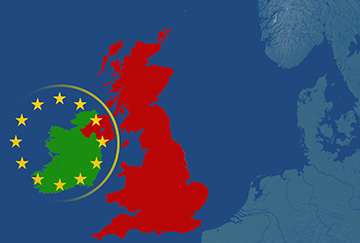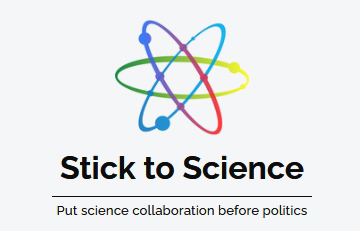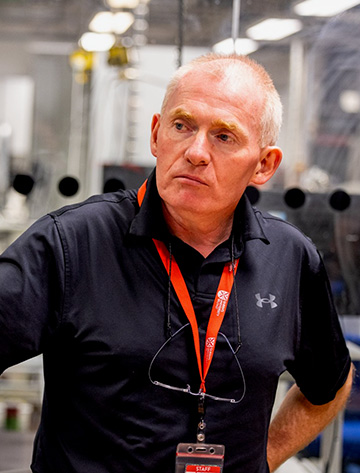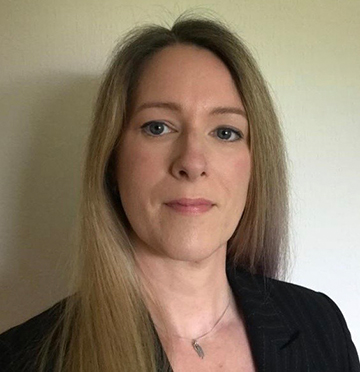
Some 21 months after signing of the Brexit Cooperation and Trade Agreement (CTA), the United Kingdom’s status in the EU’s Horizon Europe funding framework program remains an open question. [Image: Getty Images]
On Thursday, 22 September, officials of the United Kingdom and the European Union met in what was billed as a last-ditch effort to rescue the UK’s status as an “associated country” in Horizon Europe, the EU’s €95.5 billion (US$92.2 billion), seven-year research-funding framework program that began in 2021. In the past year and one-half, UK access to this lucrative funding pot has become collateral damage in the messy politics of post-Brexit international relations. And “last-ditch effort” or not, the British government left the Thursday meeting empty-handed, with the UK’s Horizon Europe association remaining in doubt.
It’s still possible that the dispute on the UK’s Horizon participation could be resolved through arbitration. But it seems increasingly likely that the UK government will instead forgo association with the EU framework program in favor of its own alternative, colloquially known as “Plan B.” What will that mean for UK–EU scientific cooperation and collaboration in the future?
Protocol blues
The threat to the UK’s Horizon participation has grown out of post-Brexit bickering on an issue far removed from science—the so-called Northern Ireland protocol. Under that protocol, Northern Ireland, though a province of the UK, remains in the EU single market for the sake of avoiding a “hard” border for trade on the island of Ireland. The protocol cleared perhaps the biggest hurdle in the rocky road to the EU–UK “divorce settlement”—the Brexit Trade and Cooperation Agreement (TCA), signed and sealed on 24 December 2020.

[Image: Beeldbewerking / Getty Images]
Soon after signing the TCA, however, the British government began to signal its second thoughts on the Northern Ireland protocol, and its intention to renegotiate—and, if necessary, even walk away from—that part of the Brexit deal. After months of fruitless talks between the UK and the EU on the point, the British government introduced a bill in June 2022 that would give the UK the right to unilaterally override big parts of the protocol. The result, not surprisingly, has been a further hardening of positions on both sides of the Channel.
Political complications
The UK’s participation in Horizon Europe has unexpectedly become a key bargaining chip in the Northern Ireland border dispute.
The 2020 Brexit TCA included terms provisionally accepting the UK as into the Horizon program (as well as other EU funding programs such as Copernicus and Euratom) as a so-called associated country. That designation—also applied to Norway, Iceland, Israel and more than a dozen other non-EU states—allows researchers from such countries to bid for, lead and participate in Horizon Europe–funded projects under specific conditions. In return for associated-country status, the UK agreed to pay £14 billion (US$15.1 billion) to help fund Horizon Europe over the framework’s seven-year timeline.
Though provisionally agreed in the Brexit TCA, the UK association agreement still needed to be ratified by the European Commission to come into force. And the Commission hasn’t yet done that for the UK, even as it has approved associated-country status for 16 other non-EU states ranging from Albania to Ukraine. As a result, the UK has effectively been locked out of the Horizon Europe program for a year and a half—and it’s no secret that the lockout is directly related to the question of the Northern Ireland protocol.
The delay from Brussels has already had some real-world consequences for UK scientists.
The delay from Brussels has already had some real-world consequences for UK scientists. At the end of June 2022, for example, 115 UK-based researchers who had won grants from the European Research Council (ERC) under the program were notified that their grants had been terminated. That happened because the rules of Horizon Europe stipulate that grant recipients must live in either EU member states or officially associated countries.
Since then, EU–UK tensions over Horizon participation have only escalated. In August, the UK requested formal consultation with the EU on the matter, with then–Foreign Secretary Liz Truss—who has since been elevated to UK prime minister—chastising the EU for “repeatedly seeking to politicize vital scientific cooperation.” But at the consultation meeting last Thursday, the EU once again declined to finalize the terms of the UK’s participation in Horizon Europe. No future talks are planned.
“Weaponizing” scientists
Not surprisingly, the scientific community has responded with consternation to the political hang-up. “It’s something not just the UK government, but many people across Europe—heads of industry, heads of scientific associations—have written to the European Commission about,” says John Lincoln of the UK Photonics Leadership Group (UKPLG). The linking of the UK’s participation in the Horizon program with the Northern Ireland protocol is “very odd,” Lincoln notes; “collaboration in science and technology and innovation has nothing to do with Northern Ireland protocol.”
In June, then–UK Science Minister George Freeman accused the EU of “weaponizing” scientists in the political dispute over Northern Ireland. (Freeman has since resigned as science minister, and the post remains vacant three months later.) Further, scientific organizations such as the Russell Group, an association of 24 UK research universities, have pleaded with both the UK government and the European Commission to find a way to overcome the impasse.

[Image: stick-to-science.eu]
But the concerns haven’t been limited to scientists in the UK. Universities, research organizations and industry figures in EU member states reportedly also have lobbied for a loosening in the EC’s position, and a decoupling of the Horizon association and Northern Ireland issues.
One example is Stick to Science, a pan-European alliance of scientists and others in the research community. The group has circulated an online petition urging the EU, the UK and Switzerland (another country stuck, for different reasons, in Horizon-association limbo) “to rapidly reach association agreements so that the two countries can contribute scientifically and financially to the strength of Horizon Europe and to a truly open, inclusive and excellence-driven European Research Area.”
Threats to collaboration
Clearly, part of the concern from British scientists lies in the success that the UK has had in previous EU framework programs. For example, in Horizon 2020, the predecessor to Horizon Europe, researchers from the UK secured more funding than those from any other country save Germany. But the scientists that OPN spoke with were if anything even more concerned about the chilling effect on collaborative links with European scientists and industry.

Robert Bowman. [Image: Courtesy of R. Bowman]
“The best science and engineering is often enabled by collaboration and cooperation,” says Robert Bowman, a research scientist at Queens University Belfast in Northern Ireland. “Rarely do you have all of the tools and techniques and skills at your unique disposal. You need a supply chain—not just at manufacturing; you have a supply chain in research as well.”
The Horizon Europe program and previous EU framework programs, according to Bowman, were “fantastic at pooling together people at a supranational level … For individual [European] countries, it’s hard to pull together groups of people with that level of capability. But you could do it at a European level—join people in a jigsaw to do a certain project together.”
What is Plan B?
In the wake of the failure of Thursday’s consultative meeting, the UK government, in a terse statement, said it was “urgently considering next steps” with the aim of supporting “the UK’s world-leading R&D sector.” The government would appear to have two options for its next move. It could proceed from consultation to the actual step of arbitration—a months-long formal legal process set out in the 2020 TCA for resolving disputes under the agreement. Or the UK could simply opt not to associate in Horizon Europe and instead to proceed with its own alternative research funding program, which has become known as Plan B.
The Plan B framework is outlined in a July 2022 policy paper of the UK Department for Business, Energy & Industry Strategy, “Supporting UK R&D and Collaborative Research Beyond European Programmes.” The plan includes various mechanisms guaranteeing support for UK researchers who have already applied to and won Horizon Europe funds; providing additional funding for scientists who wish to participate in Horizon Europe projects as “third-country” applicants; and promising “uplifts” in financing for a variety of programs related to talent and innovation support that have been closed to the UK since Brexit.
The third-party option

John Lincoln. [Image: Courtesy of J. Lincoln]
The “best bit” of Plan B, according to UKPLG’s Lincoln, is the provision for scientists who want to participate as third-country applicants. For many years, he notes, individuals even from countries not associated with EU framework funding programs could still participate as third-party collaborators, provided they brought their own funding to the table.
Under Plan B, the UK government has said that it would provide that funding for “all eligible UK entities” seeking to participate as third parties in approved Horizon Europe projects signed before 31 March 2025. And, Lincoln stresses, the funding would be available without any additional review process on the UK side.
Assuming a typical three-year timeline for most such projects, he says, that would mean support through 2028. And the funding is assured, Lincoln adds, as it comes from the money previously allocated for the UK’s originally expected association with Horizon Europe. (Beyond March 2025, the Plan B document reads, the government will “consider our approach for funding for Third Country Participation.”)
A few downsides
On the downside, Lincoln points out, such third-party participation is limited to only around two-thirds of Horizon Europe project calls—with the European Commission making the judgment on what’s open to such participation and what isn’t. In practice, that means that UK researchers, even if they bring their own money as third-party applicants, could find themselves shut out from projects with significant relevance to photonics. For example, Lincoln observes that in a recent Horizon Europe call for proposals, several calls related to quantum technologies and space research specifically ruled out third-party participation.
Elsewhere in the Plan B document, Lincoln suggests, the government’s language is a bit less concrete than it is for funding third-party participation. For example, while additional funding is pledged for a variety of schemes for attracting and retaining talent, and for various innovation programs (to make up for the loss of participation in the EU’s European Innovation Council grants), the amount and nature of the support isn’t spelled out. And Lincoln is particularly disappointed that there’s no language acknowledging the seven specific strategic focus areas spelled out in the UK’s 2021 innovation strategy—one of which was “electronics, photonics and quantum.”
Separation anxiety
The presence of Plan B should help assuage concerns about the ability of UK scientists to participate in many Horizon Europe programs. Yet some researchers still worry about the broader impact if the UK does not end up as an officially associated country, as envisioned under the 2020 Brexit TCA.
“My main concern about it would be: Is it going to put people [in the EU] off collaborating with the UK?” says Alison McLeod, a physicist who oversees the Photonics Scotland cluster of the industry group Technology Scotland, and who previously worked for 10 years in project and proposal management for collaborative EU research projects. “There’s a guarantee in place from the UK government … but I think there’s a bit of a reticence from our European colleagues to get UK companies involved in projects.”

Alison McLeod. [Image: Courtesy of A. McLeod]
McLeod further notes that even though the UK would provide funding for researchers who wanted to joined Horizon Europe projects as third-party researchers, UK organizations won’t actually be able to lead Horizon-funded projects, which can have “a little bit more impact.” And she, too, has concerns about “some areas that we’re trying to spearhead at the moment, especially within the Scottish photonic sector”—for example, quantum technology—from which the UK would be excluded if it were not an associated country.
“It’s a real shame,” she says, “because there have been so many good partnerships and networks in all the previous framework programs that have built up over the years.”
Attracting and retaining talent is another item of concern, according to McLeod. “The skills side of things, it’s something we hear across the board,” she says. “If we can’t get people from outside of the UK, or if we can’t attract people from Europe in particular … we’re not doing the best for ourselves.” Bowman, at Queens University Belfast, says the talent stream already seems to be narrowing. “We don't see the same applicant demographic coming from Europe, for things like postdoc jobs, as we did in the past,” he says. “Because you’re in Europe; why would you now go to a country that’s outside Europe?”
Finding workarounds
Bowman is generally skeptical of Plan B’s ability to address the disadvantages of the UK being excluded from full Horizon Europe participation. He points to the “bureaucracy of getting something new off the ground,” and the potential inefficiencies of the UK’s trying to stand up a parallel system. “At the end of the day, it’s not Horizon,” he says. “It can’t ever have the old benefits that Horizon has.”
Nonetheless, he says, UK and European collaboration will certainly continue, even outside of such a formal framework program. “On the ground, people are pragmatic,” Bowman says. “If someone has a particular [needed] capability … and that person happens to exist in the Netherlands, and we don't have that capability in the UK, we’re going to find a way to work with that person in the Netherlands, if it’s the right approach to solve our problem.”
McLeod adds that the photonics community in the Scotland has “good connections” with the continent, such as its ties with the Fraunhofer Institutes in Germany. “We have to just make sure that we keep them active and keep them alive.”
“Everybody here knows that collaboration is key, and that to be at the forefront of innovation, we need to collaborate,” says McLeod. “And we know we can’t only do that with our neighbors just south of the border. We need to do it on a European and a global scale.”
